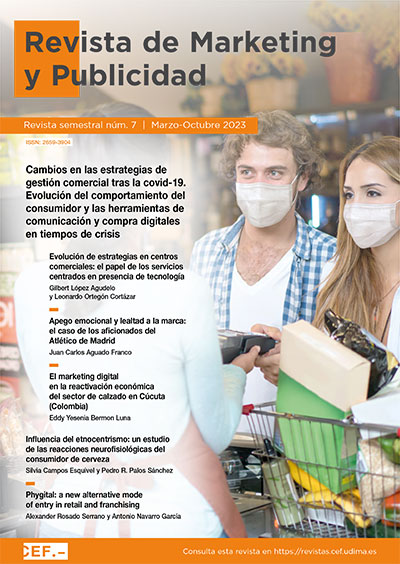Evolution of attraction strategies in shopping centers after covid-19: the role of services focused on technology presence versus visit intention
DOI:
https://doi.org/10.51302/marketing.2023.7201Keywords:
attractiveness, shopping center, smart city, modern retail environment, technologyAbstract
Analyzing the attraction factors of shopping centers called modern retail environments is a topic of general interest in marketing. In this line, the role of services based on the presence of technology has been little studied in the face of the rise of transformation and intelligent environments to favor the quality of consumers’ lifestyles and their behavioral intentions. Therefore, a research was conducted to identify the perception of services focused on the presence of technology in shopping malls from the context of smart retail environments, in order to provide information to optimize the attractiveness of these places after covid-19. The method used was quantitative with descriptive correlational analysis through an online survey applied to 682 people. The results suggest that there is a favorable perception of technology as a factor of attractiveness in shopping malls, capable of being exploited by the constant evolution of this industry, where adapting to changes in customer lifestyles and digital consumption, requires more initiatives and evaluation of technology services capable of favoring the intention to visit shopping malls.
Downloads
References
Al-Subhi, I. (2021). Smart Shopping Mall during Pandemic Situation. Journal of Student Research. 5th Middle East College Student Research Conference Proceeding. Houston, Texas. https://www.jsr.org/index.php/path/article/view/1559
Arias Gonzáles, J. L. y Covinos Gallardo, M. (2021). Diseño y metodología de la investigación. Enfoques Consulting EIRL, 8(3). http://hdl.handle.net/20.500.12390/2260
Asociación de Centros Comerciales de Colombia. (2022). ¿Centros comerciales del futuro o nueva generación? https://www.america-retail.com/colombia/centros-comerciales-del-futuro-o-nueva-generacion/
Bedia Briseño, M. R. (2022). Las ciudades inteligentes, su teorización y puesta en práctica: el caso de León Guanajuato, México. Gobierno y Administración Pública, 3, 67-83. https://doi.org/10.29393/GP3-4CIMB10004
Buendía Eisman, L. e Hidalgo Hernández, V. (2006). La mejora de un centro multicultural de la Ciudad Autónoma de Ceuta. Revista de Investigación Educativa, 24(1), 261-280. https://revistas.um.es/rie/article/view/97691
Cabello, S. (2022). El camino de desarrollo de las ciudades inteligentes: una evaluación de Bogotá, Buenos Aires, Ciudad de México y São Paulo. https://repositorio.cepal.org/bitstream/handle/11362/48000/1/S2200488_es.pdf
Camargo Salas, F. A., González Crespo, R. y Montenegro, C. E. (2021). Un modelo de ciudades inteligentes para América Latina. Estudio de Ciencias Sociales y Administrativas de la Universidad de Celaya, 11(1), 63-83. http://ecsauc.udec.edu.mx/index.php/ECSAUC/article/view/81/28
Casas Toris, U. J., Carrillo Arteaga, A. N. J. y Rodríguez Aguilar, R. M. (2020). Revisión crítica de sustentabilidad o sostenibilidad en literatura sobre ciudades inteligentes. Copala, 5(9). http://hdl.handle.net/20.500.11799/112990
Chen, S. C. (2012). The customer satisfaction–loyalty relation in an interactive e-service setting: The mediators. Journal of Retailing and Consumer Services, 19(2), 202-210. https://doi.org/10.1016/j.jretconser.2012.01.001
De Jong, M., Joss, S., Schraven, D., Zhan, C. y Weijnen, M. (2015). Sustainable-smart-resilient-low-carbon-eco-knowledge cities; making sense of a multitude of concepts promoting sustainable urbanization. Journal of Cleaner Production, 109, 25-38. https://doi.org/10.1016/j.jclepro.2015.02.004
Duygan, M., Fischer, M., Pärli, R. y Ingold, K. (2022). Where do Smart Cities grow? The spatial and socio-economic configurations of smart city development. Sustainable Cities and Society, 77, 103578. https://doi.org/10.1016/j.scs.2021.103578
Eduful, A. K. y Eduful, M. (2021). Centros comerciales, modernidad y consumo: Los centros comerciales como nuevos proyectores de la modernidad en Accra, Ghana. Revista de Cultura del Consumidor, 22(4). https://doi.org/10.1177/14695405211033666
El Tiempo. (2021). Primer centro comercial en Colombia que entra al metaverso. https://www.eltiempo.com/tecnosfera/novedades-tecnologia/primer-centro-comercial-en-colombia-que-entra-al-metaverso-694245
García, M. (2021). Tendencias en centros comerciales: El mall del futuro está más cerca. Crehana. https://www.crehana.com/blog/empresas/tendencias-en-centros-comerciales/
García Jiménez, E., Gil Flores, J. y Rodríguez Gómez, G. (1994). Análisis de datos cualitativos en la investigación sobre la diferenciación educativa. Revista de Investigación Educativa, 23, 179-213. https://idus.us.es/bitstream/handle/11441/77867/AN%C3%81LISIS%20DE%20DATOS%20CUALITATIVOS%20EN%20LA%20INVESTIGACI%C3%93N%20SOBRE%20LA%20DIFERENCIACI%C3%93N%20EDUCATIVA.pdf?sequence=1
Gomes, R. M. y Paula, F. (2017). Shopping mall image: systematic review of 40 years of research. The International Review of Retail, Distribution and Consumer Research, 27(1), 1-27. https://doi.org/10.1080/09593969.2016.1210018
González Litman, T. (2021). Colombia recupera su ocupación comercial en los centros comerciales. https://pe.fashionnetwork.com/news/Colombia-recupera-su-ocupacion-comercial-en-los-centros-comerciales,1336257.html
Hernández Sampieri, R., Fernández Collado, C. y Baptista, P. (2010). Metodología de la Investigación. (5.ª ed.). McGraw-Hill.
Hobroh, L. (2021). Transformando la experiencia en el centro comercial con tecnología inteligente. https://www.axis.com/blog/secure-insights-es/2021/10/06/tecnologia-experiencia-centro-comercial/
Ibáñez Gaona, D. A., Ismael, A. E. K. I., Montoya-Niño, A. S., Papagayo-Herrera, R. D., y Ortegón Cortázar, L. (2020). Diseño ambiental smart: una plataforma de atracción sostenible. Encuentros con Semilleros, 2(2). https://doi.org/10.15765/es.v2i2.2655
JLL. (2020). El retail adopta la tecnología «sin contacto» mientras se levantan las restricciones COVID-19. https://www.jll.com.co/es/trends-and-insights/ciudades/el-retail-adopta-tecnologia-sin-contacto-mientras-se-levantan-las-restricciones-covid-19
Krey, N., Picot-Coupey, K. y Cliquet, G. (2022). Shopping mall retailing: A bibliometric analysis and systematic assessment of Chebat’s contributions. Journal of Retailing and Consumer Services, 64, 102702. https://doi.org/10.1016/j.jretconser.2021.102702
Lagos Reinoso, G. G., Benavides Sellan, L. y Marín Lavayen, D. G. (2022). Ciudades inteligentes y su importancia ante el Covid-19. Revista Qualitas, 23(23), 101-115. https://doi.org/10.55867/qual23.08
Lorenzo, K. (2020). Evolución de los centros comerciales post covid y comercio digital. https://www.mallyretail.com/index.php?id=&id_news=1259
Makgopa, S. (2016). Determinación de las razones de los consumidores para visitar los centros comerciales. Mercadotecnia Innovadora, 12(2), 22-27. https://doi.org/10.21511/im.12(2).2016.03
Mok Kim Man, M. y Cai Qian Qiu, R. (2021). An empirical study of factors influencing consumers’ purchasing behaviours in shopping malls. International Journal of Marketing Studies, 13(1), 14-25. https://centaur.reading.ac.uk/97823/
Orozco Gómez, M. (2016). Impacto de la atractividad de un centro comercial en la satisfacción y lealtad de sus consumidores: el rol moderador de las motivaciones y la frecuencia de visita [Tesis doctoral, Universidad Autónoma de Barcelona]. Repositorio Institucional. Universidad Autónoma de Barcelona. https://www.tdx.cat/handle/10803/392688
Ortegón Cortázar, L. O. (2020). Atracción e investigación de los entornos de comercio modernos. Working Papers. Maestría en Gerencia Estratégica de Mercadeo, 1(4), 9-16. https://doi.org/10.15765/wpmgem.v1i4.1473
Ortegón Cortázar, L. y Royo Vela, M. (2015). Brand image and lexicographic analysis: An application to shopping malls. Cuadernos de Gestión, 15(2), 143-162. https://doi.org/10.5295/cdg.140485lo
Ortegón Cortázar, L. y Royo Vela, M. (2019). Nature in malls: Effects of a natural environment on the cognitive image, emotional response, and behaviors of visitors. European Research on Management and Business Economics, 25(1), 38-47. https://doi.org/10.1016/j.iedeen.2018.08.001
Portafolio. (2021). Hay poco espacio para más centros comerciales. https://www.portafolio.co/negocios/empresas/hay-poco-espacio-para-mas-centros-comerciales-549777
Reguant Álvarez, M., Vilà Baños, R. y Torrado Fonseca, M. (2018). La relación entre dos variables según la escala de medición con SPSS. REIRE. Revista d’Innovació i Recerca en Educació, 11(2), 45-60. https://doi.org/10.1344/reire2018.11.221733
Ríos Ramírez, R. R. (2017). Metodología para la investigación y redacción. Málaga-España. Servicios Académicos Intercontinentales. https://www.eumed.net/libros-gratis/2017/1662/1662.pdf
Rodríguez, M. y Mendivelso, F. (2018). Diseño de investigación de corte transversal. Revista Médica Sanitas, 21(3), 141-146. https://revistas.unisanitas.edu.co/index.php/rms/article/view/368
Ryu, K. y Jang, S. S. (2007). The effect of environmental perceptions on behavioral intentions through emotions: The case of upscale restaurants. Journal of Hospitality & Tourism Research, 31(1), 56-72. https://doi.org/10.1177/1096348006295506
Tachack, E. (2022). El consumidor evoluciona hacia la omnicanalidad. Kantar. https://www.kantar.com/latin-america/inspiracion/retail/2022-co-el-consumidor-evoluciona-hacia-la-omnicanalidad
Downloads
Published
How to Cite
Issue
Section
License
Copyright (c) 2023 Gilbert López Agudelo, Edwin Leonardo Ortegón Cortázar

This work is licensed under a Creative Commons Attribution-NonCommercial-NoDerivatives 4.0 International License.





















